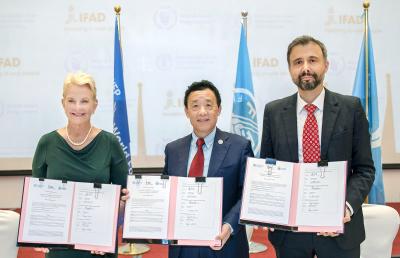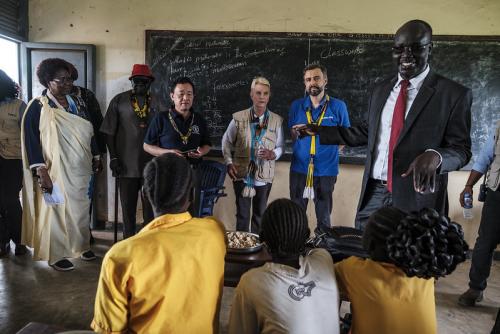Heads of Rome-based United Nations agencies call for immediate action over South Sudan crises

Juba - Heads of United Nations Food and Agriculture agencies call for greater investments in South Sudan to avoid a catastrophic food crisis.
On Tuesday, the heads of three United Nations agencies -the Food and Agriculture Organization (FAO), the International Fund for Agricultural Development (IFAD), and the World Food Programme (WFP) - warned about the escalating food, climate, and insecurity crises in South Sudan as they wrapped up a three-day visit to the country.
According to the heads of the agencies, the cost of inaction in addressing South Sudan’s complex food, climate and insecurity crises will affect the rising number of loss of lives, livelihoods, and the futures of millions of people across the young nation. It is estimated that 7 in 10 citizens are aged between 18 to 35 years old, therefore making South Sudan a country with a lot of workforce potential, however, the young citizens lack the skills and infrastructure needed to improve their country’s current situation, marking the rate of unemployment at 50%.
The Director-General of FAO, Qu Dongyu, expressed his view on the potential that he sees South Sudan saying ‘South Sudan has the potential to be the breadbasket of east Africa, but the climate crisis, poor agriculture infrastructure, instability, and economic shocks continue to disrupt agricultural and livestock productivity and food availability. Investments and enabling policies that will improve on longer-term food security, resilience and climate adaptation are urgently needed.’
‘South Sudan is a young country, full of potential, but right now families are relying on subsistence agriculture. With only four percent of farmland being cultivated, and 80 percent of its young people living in rural areas, there is enormous opportunity to grow and develop agriculture and the food sector […] we need to mobilize massive investments and implement best practices to combat food insecurity and adapt to climate change. This will also greatly improve rural employment. But we need to act now,’said Alvaro Lario, the President of IFAD, stressing the importance of acting immediately.
‘Conflict, climate change, and soaring costs in South Sudan are causing some of the highest levels of hunger in the world. But just handing out food isn’t the solution. We must break the cycle […] the potential of South Sudan is incredible. However, WFP doesn't even have the resources needed to feed those hungry today – we need the world to step up,’ said the Executive Director of the WFP, Cindy McCain.
The humanitarian emergency in South Sudan has worsened in recent years due to the conflict in Sudan which has led to more than 190,000 people fleeing into South Sudan, aggravating the situation, and straining already scarce resources.
The visit comes after the joint UN report on the State of Food Security and Nutrition in the World 2023ound that 122 million more people have been hit by chronic malnourishment since 2019 and follows just days after world leaders gathered in Rome for the UNFSS+2 summit organized to track and study the progress made to create more efficient, inclusive, resilient, and sustainable agrifood systems.
During the visit the three leaders met with the President of South Sudan, H.E. Salva Kiir Mayardit, to discuss continued collaboration. A new five-year-long agreement was signed to renew inter-agency cooperation which will see the three agencies collaborating at global, regional, and country levels to support the achievement of Sustainable Development Goal 2 – Zero Hunger.
Collaboration among the three UN agencies and with the Government of South Sudan and other partners helped to stave off famine in recent years and enabled farmers to increase their food production and incomes. However, scaled-up and sustained action is needed to respond to the ongoing hunger crisis, avoid further setbacks, and mitigate future crises.
FAO brings a wealth of technical expertise and best practice in producing food in drought-hit areas, while IFAD invests in small-scale farmers and boosting rural economies and WFP simultaneously provides emergency relief during crises and works with communities to strengthen their resilience to shocks and improve human capital. Together, the three agencies will be able to cover a larger spectrum of work needed to aid the struggles and build resilience.
As part of the renewed cooperation, the Rome-based agencies are expected to work on agrifood systems transformation, nutrition, gender equality and women’s empowerment, resilience-building, youth, and climate change.
nk

© COPYRIGHT ITALIAN INSIDER
UNAUTHORISED REPRODUCTION FORBIDDEN


